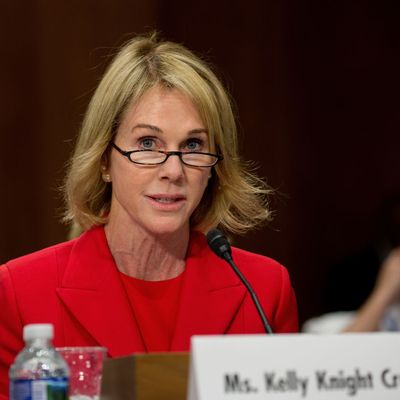
The president, not known for his interest in multilateral alliances, has taken his time nominating an ambassador to the United Nations since Nikki Haley left the position at the end of 2018. His prior, unofficial nominee, former Fox News host Heather Nauert, faced criticism for her lack of foreign-policy experience, diplomatic exposure, and understanding of U.S. alliances: Nauert caught serious flack for citing D-Day as an example of America’s “strong relationship” with Germany. Nauert withdrew from consideration in February after reports emerged that she once employed a nanny who was not authorized to work in the United States.
On Wednesday, Trump announced that Kelly Craft would be his first official nominee for the U.N. ambassadorship since Haley’s departure. Craft certainly has more experience than the previous candidate: She’s currently serving as U.S. ambassador to Canada, was part of the U.S. delegation to the U.N. during the Bush administration, and played a role in the redraft of NAFTA now known as the United States-Mexico-Canada Agreement.
Still, Democrats in the Senate will contest her nomination, and not without reason. Craft is married to Joseph W. Craft III, a billionaire coal executive who has made several efforts to cancel the Obama administration’s push to regulate his industry’s emissions, including a proposal to repeal the Clean Power Plan and the postponement of a rule that would end the practice of coal plants dumping toxic metals into rivers. His relationship with former EPA director Scott Pruitt — meeting seven times during Pruitt’s first 14 months at the agency — has been described as “cozy,” and is exemplary of the ethical sump that caused Pruitt to resign in July 2018.
If Craft’s nomination were successful, she would have an influence on significant international actions that would be harmful to her husband’s business. It’s a conflict of interest to challenge former coal lobbyist Andrew Wheeler’s title as current EPA head and the status of Rick Scott — whose company once paid a $1.7 billion penalty for defrauding Medicare — as the architect of the newest round of Trump’s nonexistent health-care reform.
Of course, one’s better half doesn’t necessarily share the same priorities in politics and environmental deregulation. But in a 2017 appearance on the Canadian Broadcasting Corporation, Craft answered a question on global warming with the textbook (and erroneous) response of climate denialists: “I think that both sides have their own results, from their studies, and I appreciate and I respect both sides of the science.” Craft’s predecessor Haley, for her part, answered a similar question by saying that climate change “is real.”
Either Craft’s conflict of interest or her 2017 statement on climate change would be enough for Democrats to contest her nomination. Together, they suggest that the Trump administration is doubling down on its rejection of the international, if symbolic, consensus on climate change. The United Nations is one of the most vital organizations available to stave off climate disaster. It hosts the annual COP conference that, in 2015, led to the historic Paris agreement, and it publishes the Intergovernmental Panel on Climate Change, a conservative and widely cited roundup of relevant academic study. With its dire scientific survey and notorious 12-year window to limit warming to 1.5 degrees, the 2018 edition of the IPCC report is an important tool to shock from their complacency those who think we can invent our way out of the problem rather than seek political solutions.
Already, the American presence in the U.N.’s climate actions is listless. With Craft as the U.N. envoy, our role in the intergovernmental body could become actively harmful.






























